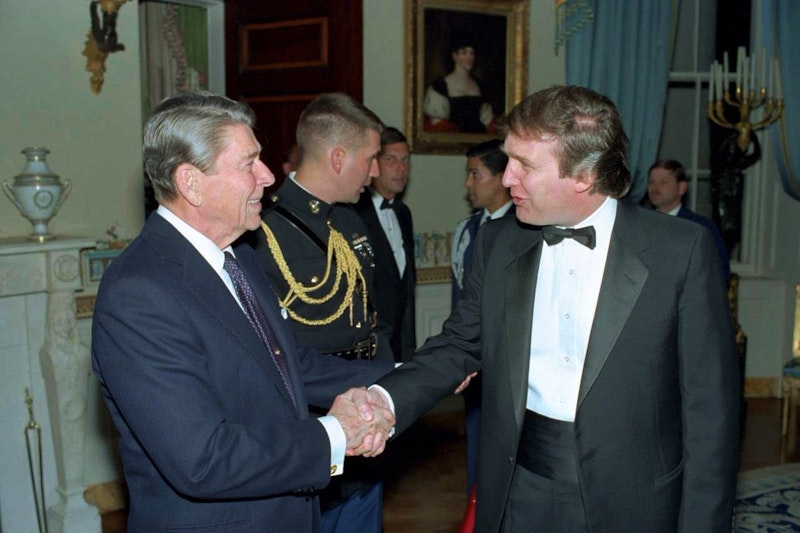"This is not Ronald Reagan's Republican Party." They've been pulling that out of the hat for a long time now, with an air of producing a decisive argument. But opinion editors have ratcheted up for this cycle. They run the very same column featuring the very same sentences: The New York Times, Guardian, Washington Post, Los Angeles Times, oh and the Tampa Bay Times.
You might think that this notion, put forward every single day on CNN and MSNBC, for example, is intended to shame Republican voters and persuade them to move off Trump on pain of hypocrisy. That can't be what this mechanized flourish is for, though, because Trump voters aren't these publications' readers and viewers. Rather, the attempt is to convey to Times and Guardian subscribers that they should congratulate themselves on their own consistency and rationality. But the people they are writing for aren't Clinton Democrats anymore either. Also this argument isn't actually about anything.
Reagan was very opposed to Russia, these articles tell us and tell us and tell us again. He helped lead NATO in a way that brought the Soviet Union to its knees. He'd be apoplectic to see his own party dithering on aid to Ukraine and harboring isolationist sentiments. The Republican Party, former Cold War bastion, now seems remarkably sympathetic to Putin.
A new raft of "not Reagan's Republican party" pieces emerged from Trump's recent remark that he'd tell Putin to "do whatever the hell he wanted" to NATO countries who don't devote the agreed-upon two percent of their GDP to defense. Democrats and editorial boards purported to interpret that as inviting Putin to attack Europe, though in fact it was a call to arm Europe more heavily against Russia. At any rate, what would Ronald Reagan say? He'd be so outraged!
However, it's been a long time since the Reagan administration. Putting it mildly, the Republican Party isn’t all that's changed. Here's something that might prove relevant even to Los Angeles Times columnists: Russia in 1984 was a left-wing dictatorship. Russia in 2024 is a right-wing dictatorship. This global political transformation since the Reagan years strikes me as something that even an opinion editor or a television pundit might regard as relevant to assessing the consistency of everyone's positions.
Reagan was an anti-communist of the first water. He cut his teeth in a conservative political environment in which that was the overwhelming unifying impulse, or the very definition of the ideology, and in which the whole world was apparently squared off between communism and capitalism. He chose capitalism, engaged in a massive defense buildup, helped bring the Soviet Union to its knees. (However, it was falling to its knees anyway under the weight of its gerontocracy, anachronistic ideology, and internal repression.) Here and there and all over the world, Reagan regarded right-wing dictators (Ferdinand Marcos, for example) with sympathy.
I don't think we have any idea how Reagan would deal with Putin; it's a completely different context, to which his driving anti-communism would be irrelevant. So I don't think you've made a point of any sort. I note in passing that Trump in his term presided over a massive military buildup similar to Reagan's.
Despite the increased spending on defense, Reagan was a (rhetorical) capitalist, in the forms this took during the Cold War. So at least rhetorically he favored free trade, as did, by and large, the Cold War-era Republican Party. After the fall of the Wall and the end of the Cold War, this position was annexed by the Democratic Party as part of what amounted to a dramatic lurch to the right during the Clinton administration, as the Dems went anti-crime, anti-welfare-state, and pro-free-trade.
The parties tend to reverse positions over and over, because they define their positions as opposites. When one shifts, in order to pre-empt or short-circuit the other, the other shifts in complement. They’re not ideological but social affiliations. They’ll change any position so they can continue to oppose each other. Also, this shows once again that “left” and “right” don’t designate anything at all over a stretch of time. Each is whatever the other isn't, this week. For sure, neither is what it was in 1980.
The Clinton administration endorsed free trade and instituted the basic deals, such as the North American Free Trade Agreement, that more or less ended American manufacturing and also, by the way, lost the working class to the Democratic Party for a generation or three. So, let's ask: in turning away from free trade, was Trump betraying the Republican Party of Reagan or attacking the Democratic Party of the Clintons (whom he was actually running against in 2016)? Meanwhile, the Democrats have changed their tune on trade: this is not the Clintons' party. As we try to figure out what’s the best policy right now, however, this is a completely irrelevant distraction. That's what it's for. More broadly, distraction is the overarching theme of American politics.
It's fair to say that neither party has any sort of clear or coherent ideology, and each is perfectly willing to pre-empt the other by throwing basic positions overboard. The people who opposed Cold War military entanglements in which the US squared off against the Soviet Union by proxies, such as Vietnam, now strongly favor massively arming anti-Russian forces. This is not George McGovern's Democratic Party.
I'd say that everyone has changed their mind since 1986. But (a) that was a long time ago and it's not the same people, really, and (b) the situation is different. I'm glad we cleared that up. You can stop running that column now!
—Follow Crispin Sartwell on X: @CrispinSartwell

